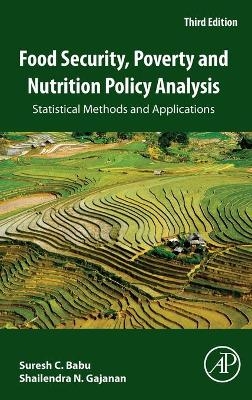
Food Security, Poverty and Nutrition Policy Analysis
Academic Press Inc (Verlag)
978-0-12-820477-1 (ISBN)
Finally, program evaluation methods which can be directly applied to the data on food security, nutrition, poverty indicators and causal factors are included. This unique, real-world data takes the reader through a "hands-on" approach toward econometric practice whereby they can also test the effects of policy and program interventions. Further, this is the first book to explore actual data with STATA and R statistical packages that also provides a line-by-line guide to the programming and interpretation of results.
Suresh C Babu is a Senior Research Fellow and Head of Capacity Strengthening at the International Food Policy Research Institute (IFPRI), Washington D.C. Before joining IFPRI in 1992 as a Research Fellow, Dr. Babu was a Research Economist at the Division of Nutritional Sciences, Cornell University, Ithaca, New York. Between 1989 and 1994 he spent 5 years in Malawi, Southern Africa on various capacities. He was Senior Food Policy Advisor to the Malawi Ministry of Agriculture on developing a national level Food and Nutrition Information System; an Evaluation Economist for the UNICEF-Malawi working on designing food and nutrition intervention programs; Coordinator of UNICEF/IFPRI food security program in Malawi; and a Senior Lecturer at the Bunda College of Agriculture, Lilongwe University of Agriculture and Natural Resources (LUANR). He has been coordinator of IFPRI’s South Asia Initiative and Central Asia Program. His past research covers a range of developmental issues including nutrition economics and policy, economics of soil fertility, famine prevention, market integration, migration, pesticide pollution, groundwater depletion, and gender bias in development. He has published more than 18 books and monographs and 80 peer reviewed journal papers. He has been on the advisory board of World Agricultural Forum and a Coordinating Lead Author of Millennium Ecosystem Assessment. He currently conducts research on Capacity Development including Economic Analysis of Extension and Advisory Services; Reforming of National agricultural Research Systems; Understanding Policy Process; and Institutional Innovations for Agricultural Transformation. He is or has been a Visiting as Honorary Professor of Indira Gandhi National Open University, India, American University, Washington DC, University of Kwazulu-Natal, South Africa, and Zhejiang University, China. He currently serves or has served on the editorial boards of the following journals – Food Security, Food and Nutrition Bulletin, Agricultural Economics Research Review, African Journal of Agricultural and Resource Economics, African Journal of Management, and African Journal of Food, Nutrition, and Development. Dr. Babu was educated at Agricultural Universities in Tamil Nadu, India (B.S. Agriculture; M.S. Agriculture) and at Iowa State University, Ames, Iowa (M.S. Economics and PhD Economics). Shailendra Gajanan is a Professor in the Department of Economics, and is the Chair of the Department of Business Management and Education at the University of Pittsburgh, Bradford. He received his BA and MA in Economics from the Presidency College and the Loyola College, University of Madras, India. He received and MA (1985) from the University of Akron, Ohio and PhD (1991) in Economics from the University of Pittsburgh. He joined the faculty of the Social Sciences Division at the University of Pittsburgh in 1991. He served previously as the Chair of the Social Sciences Division. Dr. Gajanan has served as the Program Director for Economics and has taught lower and upper level theory and policy classes in economic theory, econometrics, game theory, as well as applied classes in global hunger and environmental economics. He has also taught courses in India and West Germany. He supervises and directs International Study Abroad Programs and is slated to coordinate the Pitt-in-Himalayas in the summer of 2016. He has also served as an external evaluator on several thesis committees from universities in India and Malaysia. Dr. Gajanan’s research focuses on applied microeconomics dealing with water depletion within the commons, capacity utilization in manufacturing, the premium in the labor market for skills with English, and the impact of Category Management on product assortment in retail. He is the co-author of Food Security, Poverty and Nutrition Policy Analysis: Statistical Methods and Applications (Elsevier 2014).
Section I: Food Security Policy Analysis 1. Introduction to food security: concepts and measurement 2. Implications of technological change, post-harvest technology and technology adoption for improved food security - application of t-statistic 3. Effects of commercialization of agriculture (shift from traditional crop to cash crop) on food consumption and nutrition - application of chi-square statistic 4. Effects of technology adoption and gender of household head: The issue, its importance in food security - application of Cramer's V and phi coefficient 5. Changes in food consumption patterns: Its importance to food security - application of one-way ANOVA 6. Impact of market access on food security - application of factor analysis
Section II: Nutrition Policy Analysis 7. Impact of maternal education and care on preschoolers’ nutrition - application of two-way ANOVA 8. Indicators and causal factors of nutrition - application of correlation analysis 9. Effects of individual, household and community indicators on child's nutritional status - application of simple linear regression 10. Maternal education and community characteristics as indicators of nutritional status of children - application of multivariate regression
Section III: Special Topics on Poverty, Nutrition and Food Policy Analysis 11. Predicting child nutritional status using related socioeconomic variables – application of discriminant function analysis 12. Measurement and determinants of poverty - application of logistic regression models 13. Classifying households on food security and poverty dimensions - application of K-mean cluster analysis 14. Household care as a determinant of nutritional status - application of instrumental variable estimation 15: Achieving an ideal diet - modeling with linear programming 16. Food and Nutrition Program Evaluation
| Erscheinungsdatum | 27.09.2021 |
|---|---|
| Verlagsort | San Diego |
| Sprache | englisch |
| Maße | 152 x 229 mm |
| Gewicht | 1380 g |
| Themenwelt | Medizin / Pharmazie ► Gesundheitsfachberufe ► Diätassistenz / Ernährungsberatung |
| Sozialwissenschaften ► Pädagogik ► Sozialpädagogik | |
| Sozialwissenschaften ► Soziologie ► Empirische Sozialforschung | |
| Technik ► Lebensmitteltechnologie | |
| ISBN-10 | 0-12-820477-X / 012820477X |
| ISBN-13 | 978-0-12-820477-1 / 9780128204771 |
| Zustand | Neuware |
| Haben Sie eine Frage zum Produkt? |
aus dem Bereich


